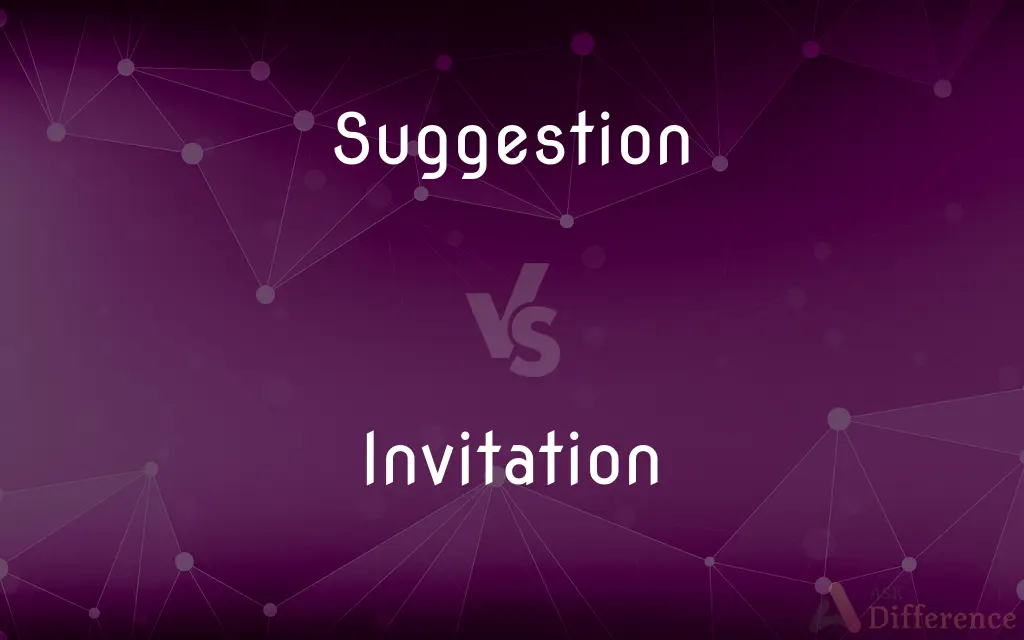Suggestion vs. Invitation — What's the Difference?
By Tayyaba Rehman — Updated on October 26, 2023
A "suggestion" is a proposal or idea offered for consideration, while an "invitation" is a request for someone's presence or participation. Both involve offering, but their intentions and contexts differ.

Difference Between Suggestion and Invitation
Table of Contents
ADVERTISEMENT
Key Differences
A suggestion is often a notion or idea proposed for someone else's consideration or action. It doesn't necessarily require a response but rather serves as a possible solution or opinion. On the other hand, an invitation specifically calls for an individual's presence or participation in an event or activity. While both can be viewed as offerings, an invitation usually expects an RSVP or acknowledgment.
When someone makes a suggestion, they're typically offering a piece of advice or a recommendation. This can range from a personal opinion on a choice of attire to a professional proposal in a business meeting. In contrast, when someone extends an invitation, they're expressing a desire for the invitee's company, be it at a personal gathering, like a wedding, or a formal event, such as a seminar.
In some scenarios, a suggestion might precede an invitation. For instance, a friend might suggest visiting a new restaurant in town (suggestion) and then invite you to go with them next weekend (invitation). Here, the suggestion serves as a precursor, laying the groundwork for the actual invitation.
The language used often differentiates between a suggestion and an invitation. Phrases like "How about...?" or "What if we...?" commonly introduce suggestions, hinting at openness and flexibility. Invitations, however, are more direct, with phrases like "Would you like to...?" or "You are invited to...", indicating a clear call to action or response.
Comparison Chart
Primary Purpose
To offer an idea or recommendation.
To request someone's presence or participation.
ADVERTISEMENT
Expected Response
Not always necessary; can be open-ended.
Usually requires an acknowledgment or RSVP.
Language Used
Often flexible ("How about...?").
More direct ("You are invited to...").
Context
Personal advice, professional proposals, casual ideas.
Events, gatherings, meetings, celebrations.
Can Precede
N/A
A suggestion.
Compare with Definitions
Suggestion
A hint or indication.
There's a suggestion of rain later in the day.
Invitation
A request for someone's presence or participation.
I received an invitation to Sarah's wedding.
Suggestion
A subtle influence on one's thoughts or actions.
The music gave a suggestion of nostalgia.
Invitation
A document or card soliciting someone's presence.
The invitation had all the details of the party.
Suggestion
A method to influence someone's thoughts indirectly.
Hypnosis often uses suggestion to modify behavior.
Invitation
An action encouraging someone to join or participate.
His smile was an invitation to ask more about his day.
Suggestion
An idea or plan put forth for consideration.
Lisa made a suggestion to try a new marketing strategy.
Invitation
An act that makes something possible or likely.
Leaving the gate open was an invitation for the dogs to escape.
Suggestion
Suggestion is the psychological process by which one person guides the thoughts, feelings, or behavior of another person. Nineteenth-century writers on psychology such as William James used the words "suggest" and "suggestion" in the context of a particular idea which was said to suggest another when it brought that other idea to mind.
Invitation
A written or verbal call to an event.
The formal invitation was embossed with gold lettering.
Suggestion
The act of suggesting
Bought the book at my suggestion.
Invitation
The act of inviting.
Suggestion
Something suggested
Are you going to follow my suggestions?.
Invitation
A spoken or written request for someone's presence or participation.
Suggestion
The sequential process by which one thought or mental image leads to another.
Invitation
An allurement, enticement, or attraction.
Suggestion
A psychological process by which an idea is induced in or adopted by another without argument, command, or coercion.
Invitation
See altar call.
Suggestion
An idea or response so induced.
Invitation
The act of inviting; solicitation; the requesting of a person's company.
An invitation to a party, to a dinner, or to visit a friend
Suggestion
A hint or trace
Just a suggestion of makeup.
The first suggestion of trouble ahead.
Invitation
A document or verbal message conveying an invitation.
We need to print off fifty invitations for the party.
Suggestion
(countable) Something suggested (with subsequent adposition being for)
I have a small suggestion for fixing this: try lifting the left side up a bit.
Make a suggestion
Traffic signs seem to be more of a suggestion than an order.
Invitation
Allurement; enticement.
Suggestion
(uncountable) The act of suggesting.
Suggestion often works better than explicit demand.
Invitation
(fencing) A line that is intentionally left open to encourage the opponent to attack.
Suggestion
Something implied, which the mind is liable to take as fact.
He’s somehow picked up the suggestion that I like peanuts.
Invitation
(Christianity) The brief exhortation introducing the confession in the Anglican communion-office.
Suggestion
The act of exercising control over a hypnotised subject by communicating some belief or impulse by means of words or gestures; the idea so suggested.
Invitation
(bridge) A bid that tells one's partner that game or slam is likely if their hand is at the strong end of what they have indicated.
Suggestion
Information, insinuation, speculation, as opposed to a sworn testimony and evidence.
Invitation
The act of inviting; solicitation; the requesting of a person's company; as, an invitation to a party, to a dinner, or to visit a friend.
Suggestion
The act of suggesting; presentation of an idea.
Invitation
A document written or printed, or spoken words, conveying the message by which one is invited.
Suggestion
That which is suggested; an intimation; an insinuation; a hint; a different proposal or mention; also, formerly, a secret incitement; temptation.
Why do I yield to that suggestion?
Invitation
Allurement; enticement.
She gives the leer of invitation.
Suggestion
Charge; complaint; accusation.
Invitation
A request (spoken or written) to participate or be present or take part in something;
An invitation to lunch
She threw the invitation away
Suggestion
Information without oath; an entry of a material fact or circumstance on the record for the information of the court, at the death or insolvency of a party.
Invitation
A tempting allurement;
She was an invitation to trouble
Suggestion
The act or power of originating or recalling ideas or relations, distinguished as original and relative; - a term much used by Scottish metaphysicians from Hutcherson to Thomas Brown.
Suggestion
The control of the mind of an hypnotic subject by ideas in the mind of the hypnotizer.
Willing to wound, and yet afraid to strike,Just hint a fault, and hesitate dislike.
Arthur, whom they say is killed to-nightOn your suggestion.
Suggestion
An idea that is suggested;
The picnic was her suggestion
Suggestion
A proposal offered for acceptance or rejection;
It was a suggestion we couldn't refuse
Suggestion
A just detectable amount;
He speaks French with a trace of an accent
Suggestion
Persuasion formulated as a suggestion
Suggestion
The sequential mental process in which one thought leads to another by association
Suggestion
The act of inducing hypnosis
Suggestion
An advice or counsel.
My doctor's suggestion was to get more rest.
Common Curiosities
Is an invitation always formal?
No, while many invitations are formal, they can also be casual, unlike suggestions which can range in formality.
Do all suggestions require action?
No, not all suggestions require action, but an invitation typically expects a response.
What is the main intention behind a suggestion?
A suggestion is primarily to offer an idea or recommendation, while an invitation requests someone's presence.
Do all invitations require an RSVP?
Not all, but many invitations, especially formal ones, expect an RSVP, unlike suggestions.
Can a suggestion be implicit?
Yes, a suggestion can be implicit or subtle, whereas an invitation is usually more direct.
Can you decline a suggestion?
Yes, a suggestion can be considered and declined, just as an invitation can be declined.
Is feedback a form of suggestion?
Yes, feedback often contains suggestions for improvement, while invitations are calls to participate.
What's a non-verbal invitation?
A gesture or action can serve as a non-verbal invitation, whereas suggestions are often verbalized or written.
Is a hint a suggestion?
Yes, a hint can be seen as a subtle suggestion, while an invitation is more explicit.
Are all invitations positive?
Not necessarily. An invitation could be to confront a challenge, whereas a suggestion could be neutral, positive, or negative.
Can a suggestion be made in passing?
Yes, a suggestion can be made casually or in passing, while an invitation typically is more deliberate.
Can suggestions and invitations overlap?
Yes, a suggestion might lead to an invitation, such as suggesting a cafe and then inviting someone to it.
Can suggestions be involuntary?
Yes, sometimes a suggestion might be made without conscious thought, unlike an invitation which is typically intentional.
Can an open door be an invitation?
Symbolically, an open door can be an invitation to enter, unlike a suggestion which might be more about possibilities.
Do suggestions influence decisions?
Suggestions can influence decisions, while invitations offer an opportunity to make a decision.
Share Your Discovery

Previous Comparison
Rent vs. Interest
Next Comparison
Deep vs. MeaningfulAuthor Spotlight
Written by
Tayyaba RehmanTayyaba Rehman is a distinguished writer, currently serving as a primary contributor to askdifference.com. As a researcher in semantics and etymology, Tayyaba's passion for the complexity of languages and their distinctions has found a perfect home on the platform. Tayyaba delves into the intricacies of language, distinguishing between commonly confused words and phrases, thereby providing clarity for readers worldwide.














































